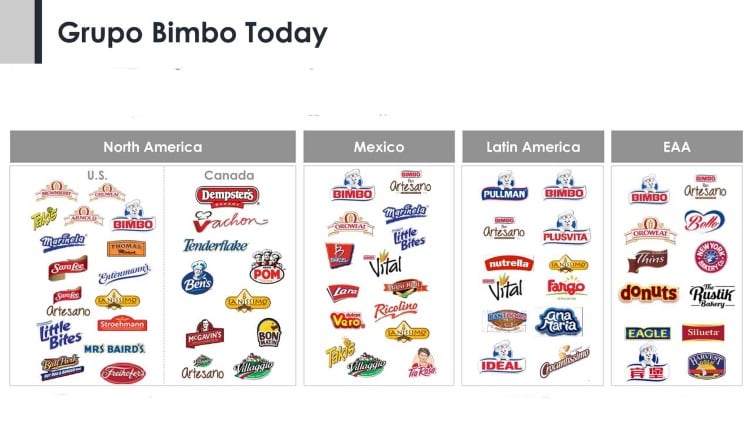According to Daniel Servitje, president and CEO of Grupo Bimbo, the company’s restructuring efforts led to a significant year-over-year double-digit growth.
Adjusted EBITDA for the third quarter ended September 30 grew 10.1% in Mexico, North America and EAA (Europe, Asia and Africa), while Mexico and the North America posted record EBITDA levels of MXN 4,978m ($261m) and MXN 4,117m ($216m), respectively.
Bimbo’s majority net income increased 6.9%, to reach MXN 1,940m ($101m), up nearly 7% from MXN 1,815m ($95m) last year.
North America
An uptick in sales of sweet bread and snacks in the US, an increased market share in Canada and the launch of new products resulted in a 3.4% sales increase in the region, which represents 50% of the company’s revenues.
Launches in the region included Arnold, Brownberry and Oroweat’s No Added Nonsense – the smart clean label initiative in the premium bread category.
This was partially offset by the portfolio optimization initiative, continued compression of the private label category and a plant flooding in Canada during the second quarter.
Mexico
The company saw a growth in the majority of categories – primarily breads, pastries, cookies and cakes – leading to an increase of 2.1% over the same period the year prior. The region represents 31% of Grupo Bimbo’s revenues.
Latin America
The region experienced a 7.4% increase, thanks to favorable performance in most of the Latin American countries – especially Chile and Columbia – primarily of tortillas and sweet bread.
Servitje said it was encouraging to see the positive trends in countries like Argentina, which is helping to offset the challenges in Brazil.
“More than half of our losses now are basically related to paying the legal lawsuits related to labor issues of the past,” said Servitje. Although corrected, a big chuck of that impact is now being felt.
EAA (Europe, Asia and Africa)
Sales grew 1.6% in the quarter, compared the year prior, boosted by the Bimbo Quick Service Restaurant (QSR) business, as well healthy sales of bread and sweet bread categories in Iberia and bagels in the UK.
“The QSR business [in China] is a healthy business that is growing significantly and we're adding capacity to serve better the needs of our customers,” said Servitje.
The company also expects its raft of recent acquisitions to strengthen its footprint in various regions, including Donuts Iberia, the agreement to acquire a Cerealto Siro Foods plant in Valencia, Spain, and Mr. Bagels in the UK.
Sustainability
Also noteworthy during the quarter was the company’s advancements in its sustainability initiatives.
Already touted as one of the world’s most ethical companies, it upped the ante by launching the first compostable packaging in Mexico for its Bimbo Vital bread in August. It also announced that 100% of its packages where the technology applies in Mexico are already biodegradable.
“We also opened the largest solar roof system in Chile and South America, built in our plant in Santiago,” said Servitje.
“And the Global Energy Race took place in 22 countries in the same day gathering around 120,000 participants. And due to everyone's participation 1.5 million slices of bread were donated to food banks in host cities.”
He added, “Our teams globally are diligently working to manage challenging economic, political and competitive conditions. We will continue to be focused on tightly managing expenses, pursuing restructuring initiatives, making investments to drive long-term growth, generating significant cash flow and de-levering our balance sheet.”
Looking to the fourth quarter, Diego Gaxiola, global director of Administration and Finance, said Bimbo expects a moderate performance considering the tough comparison of the same period of 2018, which reported record results.





